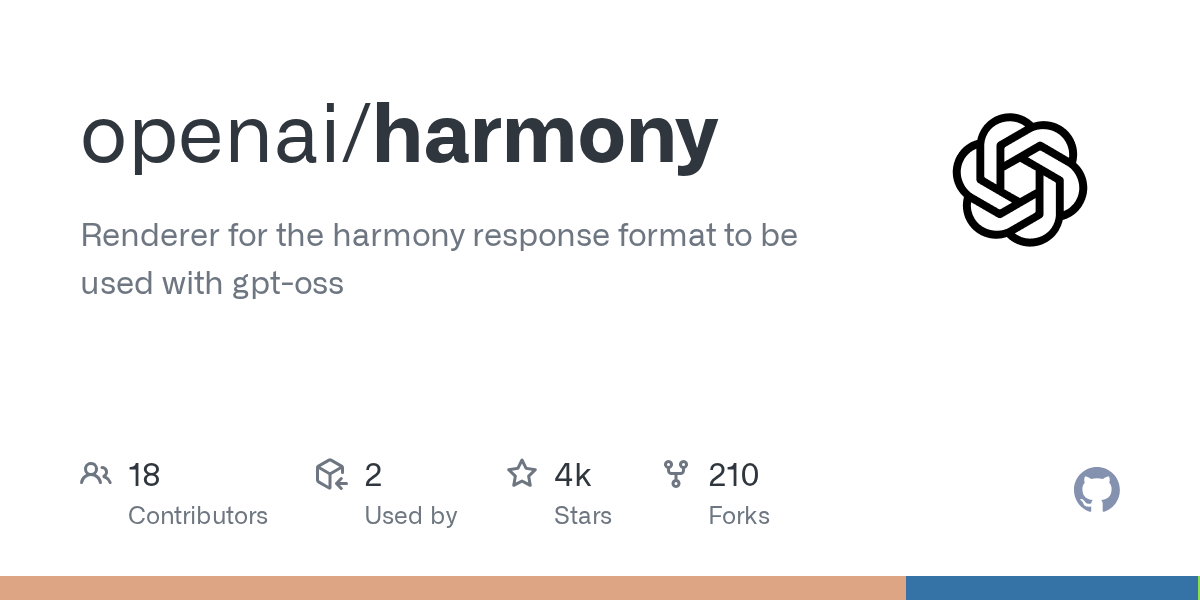Harmony: OpenAI's Renderer for GPT-OSS Response Format

Summary
Harmony is OpenAI's dedicated renderer for its `harmony` response format, specifically designed for use with `gpt-oss` open-weight models. This library provides a robust solution for defining conversation structures, generating reasoning output, and structuring function calls, ensuring consistent and efficient token-sequence handling for both rendering and parsing. It offers first-class support for both Python and Rust development.
Repository Info
Tags
Click on any tag to explore related repositories
Introduction
OpenAI Harmony is a dedicated library for rendering and parsing the harmony response format, crucial for interacting with OpenAI's gpt-oss open-weight model series. The gpt-oss models are trained on this specific format, which defines conversation structures, generates reasoning output, and structures function calls. While users interacting with gpt-oss through an API or providers like HuggingFace, Ollama, or vLLM might not need to handle this format directly, developers building custom inference solutions will find Harmony essential for ensuring correct model operation. The format is designed to mimic the OpenAI Responses API, making it familiar to those who have used that API before.
Installation
Harmony offers robust support for both Python and Rust, allowing developers to integrate it seamlessly into their projects.
Python
Install the package from PyPI:
pip install openai-harmony
# or if you are using uv
uv pip install openai-harmony
For comprehensive documentation, please refer to the official Python documentation.
Rust
Add the dependency to your Cargo.toml:
[dependencies]
openai-harmony = { git = "https://github.com/openai/harmony" }
For comprehensive documentation, please refer to the official Rust documentation.
Examples
Here are examples demonstrating how to use Harmony in both Python and Rust to render and parse conversations.
Python Example
from openai_harmony import (
load_harmony_encoding,
HarmonyEncodingName,
Role,
Message,
Conversation,
DeveloperContent,
SystemContent,
)
enc = load_harmony_encoding(HarmonyEncodingName.HARMONY_GPT_OSS)
convo = Conversation.from_messages([
Message.from_role_and_content(
Role.SYSTEM,
SystemContent.new(),
),
Message.from_role_and_content(
Role.DEVELOPER,
DeveloperContent.new().with_instructions("Talk like a pirate!")
),
Message.from_role_and_content(Role.USER, "Arrr, how be you?"),
])
tokens = enc.render_conversation_for_completion(convo, Role.ASSISTANT)
print(tokens)
# Later, after the model responded …
parsed = enc.parse_messages_from_completion_tokens(tokens, role=Role.ASSISTANT)
print(parsed)
Rust Example
use openai_harmony::chat::{Message, Role, Conversation};
use openai_harmony::{HarmonyEncodingName, load_harmony_encoding};
fn main() -> anyhow::Result<()> {
let enc = load_harmony_encoding(HarmonyEncodingName::HarmonyGptOss)?;
let convo =
Conversation::from_messages([Message::from_role_and_content(Role::User, "Hello there!")]);
let tokens = enc.render_conversation_for_completion(&convo, Role::Assistant, None)?;
println!("{:?}", tokens);
Ok(())
}
Why Use Harmony?
Harmony offers several compelling advantages for developers working with gpt-oss models:
- Consistent formatting: A shared implementation for both rendering and parsing ensures token-sequences remain loss-free, maintaining data integrity.
- Blazing fast performance: The core logic, built in Rust, provides high performance for demanding applications.
- First-class Python support: Enjoy seamless integration with Python projects, including easy installation via
pip, comprehensive typed stubs, and 100% test parity with the Rust suite.
Links
Explore Harmony and related resources further:
- GitHub Repository: openai/harmony
- Try
gpt-oss: gpt-oss.com - Learn more about
gpt-oss: OpenAI Cookbook gpt-ossModel Card: OpenAI- Learn more about the
harmonyformat: OpenAI Cookbook